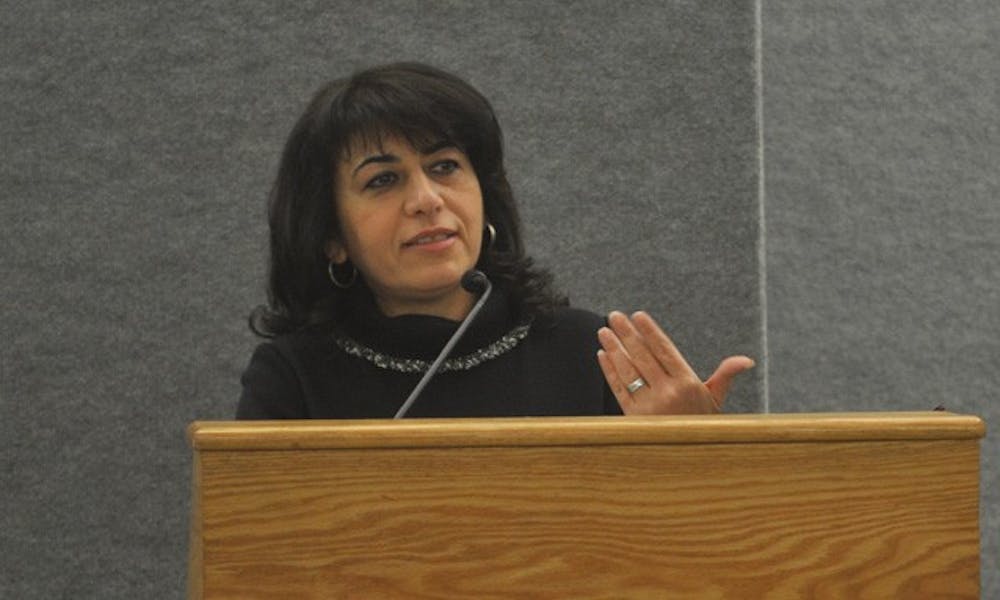When she discovered her name was on Saddam Hussein’s list of enemies, Poet Dunya Mikhail realized artistic expression in a dictatorial regime came with consequences.
Part of the Duke University Union’s Major Speakers Series, Mikhail spoke about Arab art and censorship to about 50 people in the Bryan Center Thursday night. The Iraqi exile, who fled from Iraq in 1995, is the 2001 recipient for the United Nations Award for Freedom of Writing and a published author teaching Arabic in Michigan.
“Last year, we lacked a female voice in the speaker series, so we decided to sign Dunya Mikhail for this Fall’s series to diversify the speakers,” said junior Yi Zhang, chair of DUU’s Speakers Series.
Mikhail began by reading from one of her poems, “I was in a hurry,” relating it to her experience leaving Iraq in and adjusting to life in the United States.
“I couldn’t write for that first year. I was trying to find my space,” she said. “I later discovered that it was only when I started writing poetry that this space became a place. Poetry made me feel at home.”
Mikhail discussed how her transition between living in Iraq and moving to America is reflected in her memoir, “Diary of a Wave Outside the Sea.” Divided into two parts, the memoir’s first section was written during the Iraq war and is more poetic, filled with metaphors and symbols, she said.
Hoping to avoid censorship, Mikhail said she used figurative language to embed her criticism of war beneath symbolism and imagery. The second part, which Mikhail wrote after she was exiled, is mostly direct prose and reflects her life in Baghdad and the United States.
Mikhail worked as the literary editor for the Baghdad Observer until the censors picked up on her objections to Saddam Hussein’s regime and placed her on his list of enemies. When Mikhail received news that she would die if she did not leave, she was forced to flee to Jordan, she said. But by changing her occupation on her identification from “journalist” to “poet,” she avoided stacks of paperwork and saved time, allowing her to escape.
“Poetry saved my life, even though it was because of poetry I had to leave in the first place,” she said in reflection.
Mikhail also explained how she regretted leaving her many books at home when she fled.
“I later found out that my cousin used pages from my books to wrap falafels during the economic sanctions [when paper was in short supply],” she added.
Mikhail said she often juxtaposes themes of love and war in her poems, noting the irony of the Arab word for “love,” which when changed by one letter, becomes the word “war.” Mikhail added that we sometimes respond to catastrophe with an aesthetic response of love.
“In fact, the number of weddings actually increased during the war,” she said.
When asked about her opinion on the war on Iraq, Mikhail said she did not believe using violence to bring about political stability is effective.
“Like most of other Iraqis, I dreamed of change,” she said. “But I didn’t want change through war. The ends don’t justify the means.”
Mikhail emphasized the importance of poetry in helping her deal with her hardships and painful memories.
Toward the end of her talk, Mikhail referenced the Greek myth, “Orpheus and Eurydice,” relating how Orpheus lost his wife because he looked back.
“I feel like Orpheus because I can’t look back,” she said. “I am an exile and my homeland is gone forever.”
The students, faculty and Durham residents that attended the talk reacted positively to Mikhail’s poems.
“I really liked Mikhail’s poetry,” freshman Shahnaz Khandoker said. “I was inspired by her poem, ‘I was in a hurry,’ and when she talked about how it was difficult to forget her country.”
Get The Chronicle straight to your inbox
Signup for our weekly newsletter. Cancel at any time.

